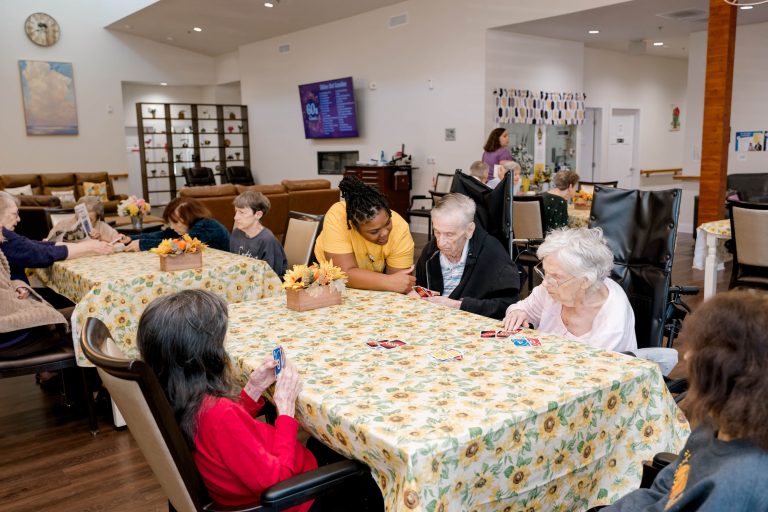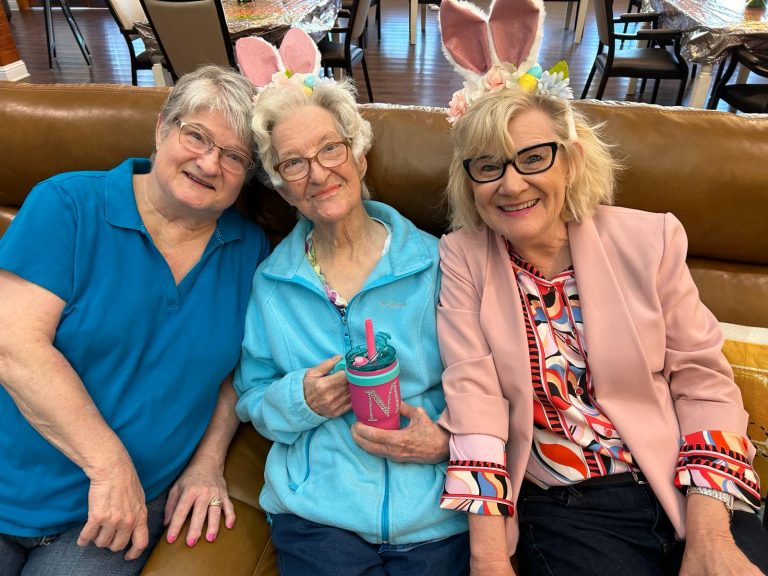Dementia Caregiving Tips: Supporting Your Loved One in Memory Care
At Beehive Homes of Rowlett, we understand the challenges and rewards of caring for someone with dementia. This journey can be filled with love, frustration, and a constant desire to provide the best possible support. We’ve created this guide to empower caregivers with practical tips and strategies for daily life.
Creating a Safe and Secure Environment
Routine is Key: People with Alzheimer’s disease thrive on predictability. Establish a daily routine for waking times, meals, medications, and activities. This creates a sense of security and reduces confusion. Consider using visual aids like clocks or charts to help them stay oriented.
Home Sweet Home: If your loved one remains at home, dementia-proof the environment. Remove tripping hazards, secure loose rugs, and install grab bars in bathrooms. Ensure proper lighting throughout the house, especially at night to prevent nighttime confusion. Surround them with familiar objects and cherished photos for comfort.
Communication: Understanding and Connecting
Speak Simply and Clearly: Use short, simple sentences and avoid complex instructions. Focus on one task at a time and allow ample time for responses. Break down complex tasks. Make it smaller and easy.
Listen with Patience: Dementia can make communication difficult. Practice active listening, make eye contact, and avoid interrupting. Validate their feelings and offer reassurance. Use positive reinforcement and praise their efforts to communicate.
Focus on Nonverbal Cues: Body language and tone often speak louder than words. Pay attention to facial expressions and gestures to understand their needs and anxieties. A furrowed brow might indicate confusion, while clenched fists could signal frustration.
Maintaining Independence and Dignity
Respect Choices: Whenever possible, offer choices to promote a sense of control. Let victims of Alzheimer’s disease pick their clothes from a pre-selected outfit rotation, select meals from a limited menu, or choose an activity from a suggested list.
Focus on Abilities: Don’t take over tasks they can still manage. Encourage them to complete daily activities like dressing, eating, or grooming as independently as possible. Celebrate their successes, no matter how small.
Activities and Stimulation: Engage them in activities they enjoy, like listening to music from their youth, gardening if manageable, or simple crafts like folding laundry. This provides mental stimulation, a sense of purpose, and helps maintain cognitive function for as long as possible.
Behavioral Changes: Understanding and Responding
Dementia can manifest in various behavioral changes, including wandering, agitation, or repetitive questioning. Here are some tips for navigating these challenges:
Identify Triggers: Try to identify what might be triggering the behavior. Is it a change in routine, unfamiliar surroundings, or feeling overwhelmed?
Stay Calm and Reassure: Remain calm and patient in your interactions. Speak in a soothing voice and offer reassurance.
Distraction and Redirection: Sometimes, distraction can be the best approach. Offer a favorite snack, suggest a calming activity, or redirect their attention to something pleasant.
Seek Professional Help: If behavioral changes become severe or difficult to manage, consult a doctor or dementia specialist. They can provide guidance and explore potential medication adjustments.
Caring for Yourself: The Importance of Self-Care
You Can’t Pour from an Empty Cup: Caring for someone with dementia is demanding. Schedule time for yourself to recharge and de-stress. Pursue hobbies you enjoy, spend time with loved ones who can offer support, or seek professional help if needed. Consider relaxation techniques like meditation or deep breathing exercises.
Support Groups: Connect with other caregivers. Sharing experiences and challenges can provide invaluable emotional support and practical advice. There are both online and in-person support groups available. Look for groups specific to your loved one’s type of dementia or caregiving challenges.
Seek Help When Needed: Don’t be afraid to ask for assistance. Talk to family members, friends, or professional caregivers. Accepting help allows you to provide better care for your loved one and avoid caregiver burnout. Consider in-home care services for a few hours a day to give yourself a break.
Beehive Homes: The Best Memory Care Facility in Rowlett
At Beehive Homes of Rowlett, we specialize in memory care and understand the unique needs of dementia patients. We offer a warm, secure environment with a team of compassionate caregivers trained to provide personalized care plans. Our services include:
24/7 Supervision and Support: Our dedicated staff is available around the clock to ensure the safety and well-being of your loved one.
Structured Activities and Programs: We offer a variety of engaging activities designed to stimulate the mind, promote socialization, and maintain physical well-being.
Safe and Secure Environment: Our facility is secured to prevent wandering and features calming spaces for relaxation.
Nutritional Meals and Snacks: We provide nutritious and delicious meals prepared by our in-house chefs, catering to individual dietary needs.
Family Support and Communication: We believe in open communication and keep families informed and involved in their loved one’s care.
We understand that the decision to place a loved one in a memory care facility is difficult. However, Beehive Homes of Rowlett can provide a supportive and enriching environment where your loved one with Alzheimer’s disease can thrive. We offer tours and consultations to answer any questions you may have.
Remember, you are not alone on this journey. We are here to support you and your loved one every step of the way.
We encourage you to explore these resources and reach out to Beehive Homes of Rowlett for a personalized consultation.
Together, we can create a supportive and enriching environment for your loved one with dementia.






